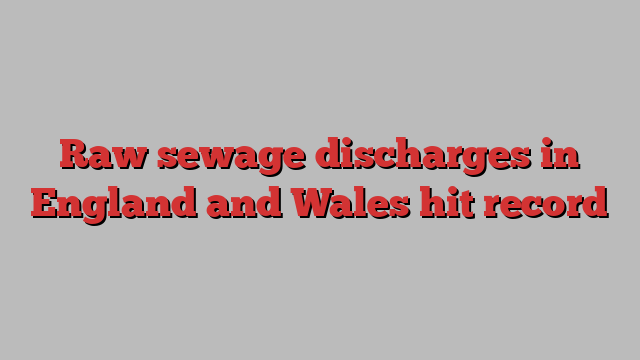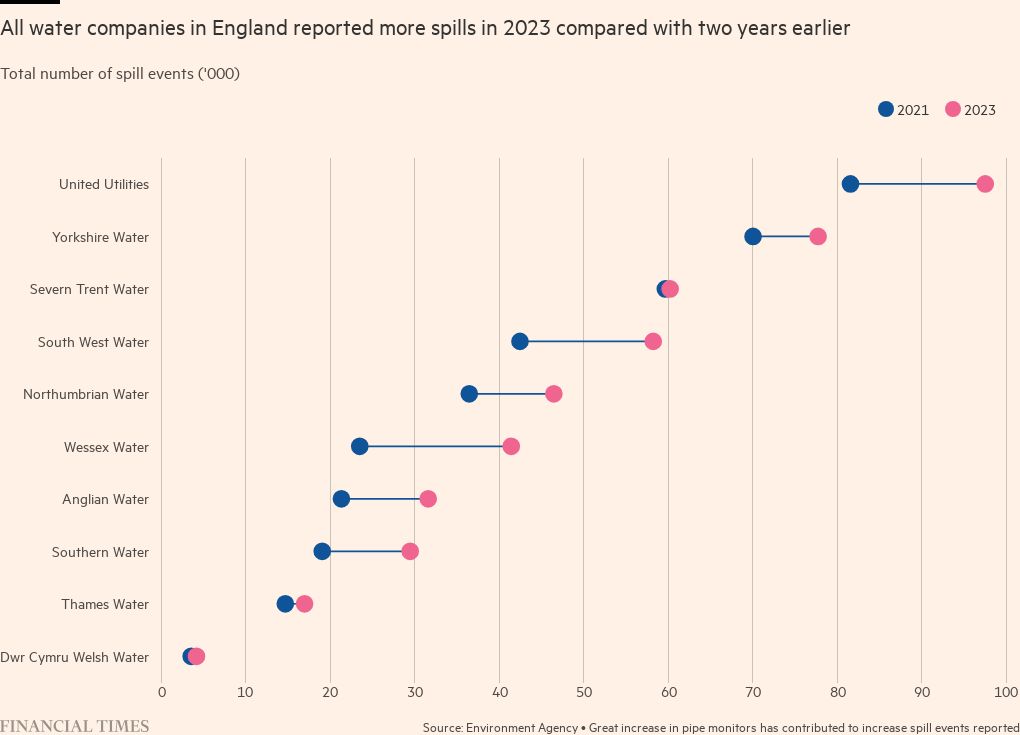
Unlock the Editor’s Digest for free
Roula Khalaf, Editor of the FT, selects her favourite stories in this weekly newsletter.
The number of raw sewage discharges into rivers and the sea in England and Wales hit an all-time record in 2023, according to official figures that sparked calls for Rishi Sunak’s government to declare a national emergency.
Some 464,056 spills were recorded in 2023, up 54 per cent from 301,091 the year before, the Environment Agency said on Wednesday. That was the highest since data collection began in 2015, when monitors started to be installed.
Sites in some parts of England and Wales were spilling almost every day of the year, according to data from the environmental regulator.
The sharp rise in discharges reflects an increase in monitoring of the 14,318 storm overflow pipes, which are designed to release untreated sewage and storm water into coastal waters and rivers when it rains to prevent flooding.
Last year was the first in which all the overflow pipes were monitored, said the Environment Agency, which also pointed to one of the wettest 12-month periods on record.
Sir Ed Davey, leader of the Liberal Democrats, said the data was a “scandal” and called on Prime Minister Rishi Sunak “to finally deal with this disgraceful situation and declare a national environmental emergency.
“Sewage spills are increasing, our precious countryside is being destroyed and swimmers are falling sick,” he said.

Davey’s call was echoed by Ash Smith, of the Windrush Against Sewage Pollution campaign, which revealed spills were happening even in dry periods. He said the pollution “should be dealt with as an emergency to avoid a catastrophe”.
Southern Water’s sewage and storm overflow at the river Lavant near Chichester recorded the longest spill at 6,452 hours — almost 273 days.
The requirement for water companies to install event duration monitors since 2015 has transformed public awareness of sewage discharges and sparked the biggest outcry against the water companies since they were privatised 34 years ago.
Both Labour and the Conservatives have called for executives’ bonuses to be banned, but the main opposition party has accused the government of stalling on implementing the proposal by launching a consultation rather than introducing an immediate ban.
The average total remuneration of the chief executives of the largest 10 water and sewage companies in England and Wales was £1.1mn in the year to March 2023.
The bosses of five — Thames Water, Welsh Water, Yorkshire Water, South West and Southern Water — gave up their bonuses in recognition of pollution issues but have failed to make similar pledges this year.
Steve Reed, Labour’s shadow environment secretary, said: “The evidence is clear. We don’t need the dither and delay of a consultation, we need immediate action.”
Water minister Robbie Moore said the data showed “water companies must go further and faster to . . . clean up our precious waterways”.
Helen Wakeham, water director at the Environment Agency, said the figures were “disappointing” but “sadly not surprising”, adding: “It is a complex issue that won’t be solved overnight.”
Water companies have asked industry regulator Ofwat for permission to increase bills for households in England and Wales by as much as 70 per cent by 2030 in order to address sewage outflows.
Ofwat is expected to issue a draft ruling in June, but the Consumer Council for Water has warned that the increases are unaffordable for most customers.
Water UK, which represents the industry, said the figures were “unacceptable and demonstrate exactly why we urgently need regulatory approval to upgrade our system so it can better cope with the weather.
“We have a plan to sort this out by tripling investment which will cut spills by 40 per cent by 2030. We now need the regulator Ofwat to give us the green light so that we can get on with it,” the trade body added.
The regulator’s figures are likely to underrepresent the extent of the pollution as the monitors record only when the outflows occur and not the volume released.
A further 7,000 emergency pipes, which are designed to be used in the case of a power outage, for example, are still to have monitors installed, starting from next year.
Ofwat has also pointed to maintenance failures, with about one in six devices working less than 90 per cent of the time in 2022.
Just 16 per cent of waterways in England and Wales meet minimum EU standards and none meet the standards for chemicals, according to separate Environment Agency data.

